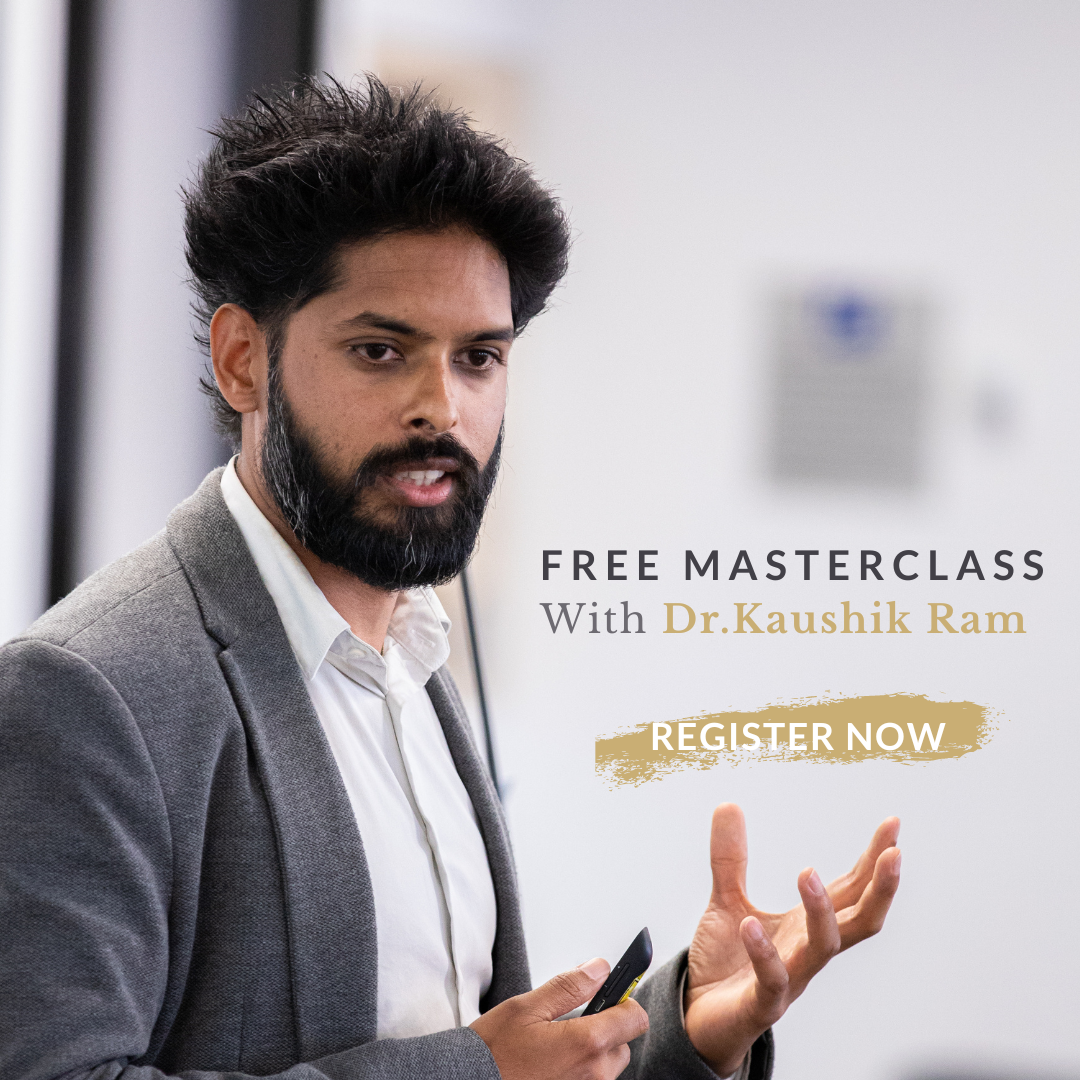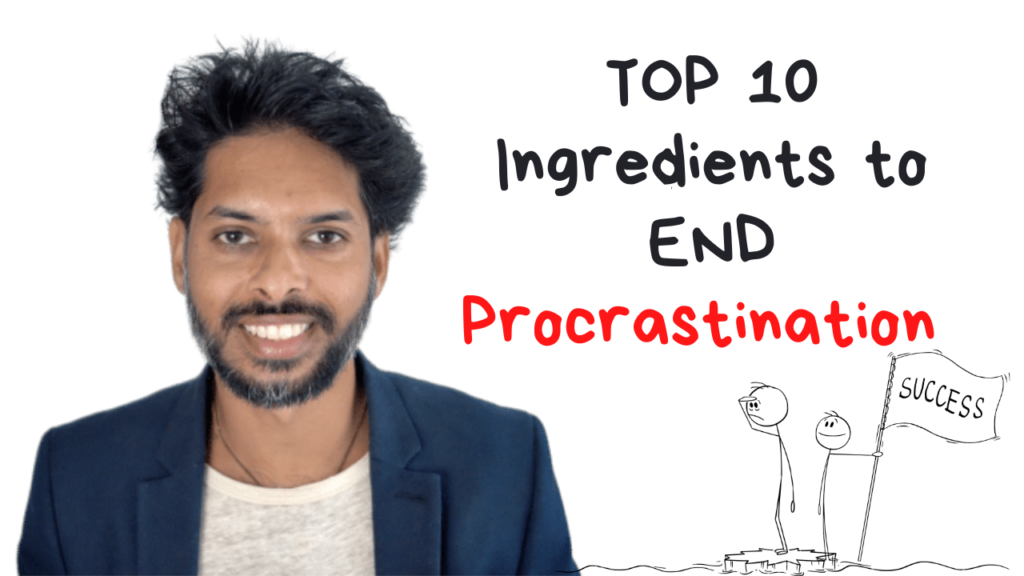Craftsmanship of Thought: Top 10 Ingredients to END Procrastination
There is a timeless formula to the execution of thought. There are however genuine reasons to why the first step is the hardest to take and and the resistance it creates is called procrastination. In this video I share the Top 10 ingredients to melt away this resistance through: The Craftsmanship of Thought.
#1 Dopamine reset
There is a general consensus that it is better to think than not to think. We can however get addicted to our own thoughts. This chronic thinking can become detrimental and shows up as procrastination in the following order:
- Flight mode where we are anxious, avoidant and deliberately focus on less urgent and more enjoyable activities until the last minute
- Fight mode arrives when the deadline hits and we are sprung into an adrenaline fuelled action.
The Dopamine pathway in this survival response is completely flawed. When we are in fight or flight we are primed for short term rewards and an inability to think long-term.
Dopamine release without any prior effort is particularly dangerous
We must instead reset the dopamine pathway to long-term reward by learning to be in the parasympathetic – calm and relaxed state and focus on long-term goals which stimulates dopamine release during pursuit rather than depleting the dopamine system with a quick emotional fix.
We will return to remaining consistent long-term later in this Post.
#2 Leaving the learning curve
 It is important to have an insatiable thirst for curiosity. It is part of learning, growing and evolving.
It is important to have an insatiable thirst for curiosity. It is part of learning, growing and evolving.
There can however, be an infatuation to asking questions and spend hours researching and explore pointless new concepts and ideas. This is the trap of overthinking and overanalysing.
The inability to come to a natural resolution leads to much uncertainty with a inclination towards procrastination.
The craftsmanship of thought requires the rapid assimilation and integration of new ideas and the ability to bring this thought line to a logical conclusion and safely exisiting the learning curve before hitting a psychological asymptote.
#3 Ability to acknowledge flaws
The ego will prevent us from admitting our faults in fear of being perceived as inferior. Yet when we refuse to accept that we have insecurities and pretend that they are not there, it creates a false identity.
We cannot perfect what is false.
Procrastination can happen when we over-invest in a false identify. In this case, we can think things through over, and over to the point of overcomplicating the process. This leads to overwhelm and confusion and the perfect excuse to not beginning in the first place.
We must accept that sometimes we make a mess trying to figure things out before we find what works seamlessly.
#4 Preference for solitude
An essential part of existing the learning curve is taking time to reflect and process past experiences.
Inaction does not always mean procrastination.
 It takes time and space access a situation with higher order thinking. When in fight or flight, it is easy to move from one thing to the next too quickly. This is the behaviour of an anxious brain and a complete denial of the comfort of your own presence.
It takes time and space access a situation with higher order thinking. When in fight or flight, it is easy to move from one thing to the next too quickly. This is the behaviour of an anxious brain and a complete denial of the comfort of your own presence.
When we dedicate time to recharge in a thought-free space, it give the brain an opportunity to take a break from thought. Because just like the heart cannot sustain beating at 180bpm, the brain requires downtime, in addition to sleep.
The nature of your thought is dependent on the rate of your heart.
The rhythm of your heart determines the quality of your thought to hit the right note. Without solitude we may never discover our natural rhythm and remain out of sync with this moment.
#5 Transcending thought
The momentum of rapid realisation begins with one simple realisation: you are not your thoughts, but the awareness that precedes it. Without this realisation, many spend an entire lifetime hallucinating reality under the spell of thought. Eastern traditions refer to this spell as maya, illusion or simply the Ego.
When we are not attached to our thoughts, we can witness thoughts appear momentarily within the echo chamber of our brain. This dilutes the vicious momentum of thought and leads to the great act of surrender.
When we surrender, we are truly free because our thoughts have no power over us.
This is when reality begins to untangle from the toxic seduction of the mind and we observe things simply as they are – without the burden of thought.
For as long as we are held hostage by our own thoughts, the possibilities that exist in the elusive unknown will remain out of reach.
#6 Reconstruction of thought
To remain in this senseless thought-free existence is the greatest act of procrastination. Many who wonder into the aetiology of Eastern Traditions end up in this existential trap.
The idea is to acquire a thought free state where you can untangle from the dispositions inherited from parental wounds, intergenerational trauma, coping mechanisms that have out lived their welcome so your identity is not threatened by the cultural/political orientation of the day.
The reconstruction of a strong self identity comes from addressing the question – What would a Free Man or a Free Woman do?
A strong self identify is crafted not from the mind but from the heart. As we discovered previously, the stronger our identification with thought, the greater the fragility of our Ego.
A conflict of interest between the head and the heart arises because those who do not trust their heart, do not trust themselves and therefore are incapable of leading.
The mind has a habit of serving whatever it places it’s attention on. The mind is a useful servant but a dangerous master. Without a Master, the mind becomes self-serving.
It becomes effortless to act from the heart the moment the mind surrenders, in service of Love.
#7 Strong self-disciple
The heart does not think but create the milieu within which we are calm, confident and clear. This fosters a strong self-discipline – to do whatever it takes, despite the odds. We are clear with what we like, dislike, our goals and ambitions.
 The nervous system is relaxed and there is more oxytocin in the system which leads to connection, trust in the unknown and a sense of openness to possibility.
The nervous system is relaxed and there is more oxytocin in the system which leads to connection, trust in the unknown and a sense of openness to possibility.
When we are calm and relaxed, we have all the time in the world to think long-term and see things through because we have clear boundaries on what distracts us from mission.
The key to remaining consistent long-term does not come from doing more, but doing less!
#8 Maintain variety of interests
Doing less gives more time to do what matters. An essential part of staying focused is not simply having, but maintaining a variety of long-term interests.
When we have a single focus, we can work our brain to exhaustion. It is important to break up the day and challenge the brain by switching context, remain highly adaptable and creative and return to the main goal with a fresh perspective and renewed conviction.
These long-term commitments are non-negotiable. They include nutrition, fitness, intimacy, family and fun.
The beauty of life is found in making what seems inconsequential – magical.
#9 Open mindedness
Sometimes we procrastinate simply because we a stuck with a rigid point of view.
Open mindedness isn’t about being easily swayed or seeing all points of views while remaining on the fence in fear of have your own opinion.
Open mindedness is having a mind that operates on multiple channels so you can think logically, empathetically, goal-oriented, abstract and critically. These are all aspects that allow us to synthesis new and original ideas.
What drives action is often the influx of new ideas, innovation and the excitement of breaking into new territory.
#10 Community
By far one of the most under-utilised assets is a community that is action oriented. Whether it is your team at work, business owners mastermind, friends who you go on adventures with or an encouraging spouse or family member.
It is about establishing a healthy relationship by being able to respond in ways that are appropriate to the needs of the moment and this happens effortlessly when you are in service to love.
After all, it is through each other that we learn to love ourselves and love is an inexhaustible driving force.

Use My Proven Nervous System Training Trusted by Busy Executives to Eliminate Anxiety Permanently!

